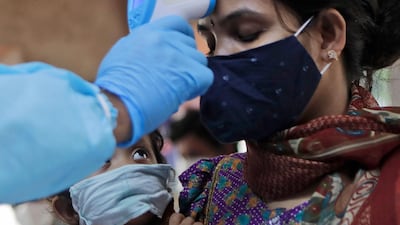Another day, another needless interaction with police for Geeta Hasija. The deputy manager for an Indian bank, and thereby essential service employee, has been stopped four times on her way to work as India intermittently continues the world’s largest lockdown.
"The police questioned us when my deaf friend was driving me to the bank; even a travel authorisation letter from my office did not convince them," Ms Hasija, who is deaf, told The National through an Indian Sign Language interpreter.
Once, she had to walk the entire eight kilometres to reach her bank, so the next time, she got her hearing nephew to speak on her behalf. That sorted everything, she said.
“I was told that no one would stop me anymore,” Ms Hasija, 36, recalled. “One hearing man could achieve what two deaf women couldn’t.”
Ms Hasija is one of thousands of women with disabilities whose lives have been made more difficult because of coronavirus restrictions and a lack of access to services and information.
A new report from Rising Flame, an NGO that works for disability rights, in collaboration with Sightsavers, found disabled women had been effectively ignored in provisions made by the Indian government for curbing the pandemic.
The 2011 Indian census recorded 11.8 million women with disabilities, and yet, does not disaggregate data about them, meaning they are excluded from laws and research. While the government released the Disability Inclusive Guidelines for the pandemic in March, the only gender component they include is that women and children with disabilities should be given "special care" during treatment. The shadow pandemic – domestic violence cases that spiralled during the lockdown – has been thoroughly discussed, but again, women with disabilities were left out.
Nidhi Goyal, executive director of Rising Flame, was worried that women with disabilities, who are already largely ignored in government policy, would slip through the cracks in policy-making during and after the pandemic.
The 93-page first-of-its-kind Neglected and Forgotten: Women During the Covid Crisis in India report examined the problems faced by women with disabilities, measuring barriers to access, education, health, hygiene and sanitation, food and essentials, social protection, employment and livelihood, emotional wellbeing and domestic violence.
The team behind the report interviewed 82 women from 19 states in five languages.
Of those 82 women, 75 were found to have faced some form of access barrier with respect to communication, physical and digital spaces, health services, education, food essentials and information.
"The Aarogya Setu [contact tracing and information] app is not accessible for people with disability," a 31-year-old blind woman from Kerala told researchers, adding that the guidelines were inaccessible for blind people.
“It is a scanned document in a PDF document. This is not readable by screen readers. They should be following the web content accessibility guidelines.”

In late March, the government announced disabled people were eligible for an ex-gratia amount of 1,000 rupees and advance three-month pension of 300 or 500 rupees based on age. However, none of the 28 women interviewed who qualified for the 1,000 rupees had received the sum. However, none of the 28 women interviewed who qualified for the 1,000 rupees had received the sum.
But it is not just policy getting in the way.
In some cases, the report found the recipients’ husbands had withdrawn the money from the bank and spent it on alcohol, without her permission. Loss of jobs and stress led to domestic violence, but inaccessible helplines meant women with disabilities had no way to speak up.
A woman with locomotor disability staying with her brothers was sent back to her abusive husband’s home as they could no longer afford to support her because of the economic losses incurred during the pandemic.
Another woman in Ahmednagar, Maharashtra, described falling down in the street and finding no one willing to help her.
“In normal times, someone definitely used to come to pick me up if this sort of a thing happened. But that day, no one came,” she told researchers.
“Then I took out my sanitiser from my purse, and gave it to the shopkeeper, and then he came to help me get up.”
Ms Goyal, who is the lead researcher, said the report highlights problems that already existed, but are exacerbated due to lockdown. “We need to take immediate cognisance of these issues and build back better.”
The report noted the criticality of taking into account the concerns of women with disabilities when creating disaster management guidelines. Some of its key recommendations comprised dissemination of information on the pandemic in accessible formats, availability and accessibility of helplines and complaint mechanisms, and keeping disability pensions up-to-date with the additional costs of people with disabilities and releasing them in a timely manner.
The report was being taken to policymakers across all segments that the report covered, Ms Goyal said. “It will take us a long way in providing evidence of our barriers,” she added.












